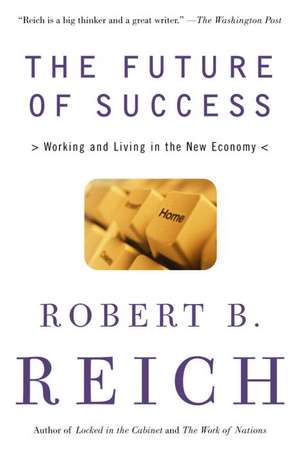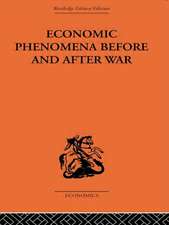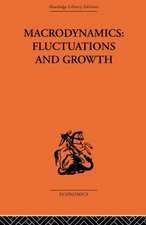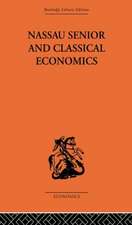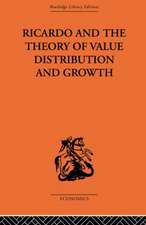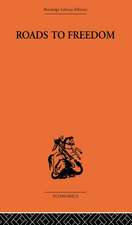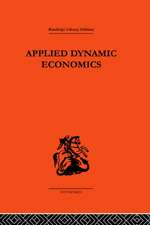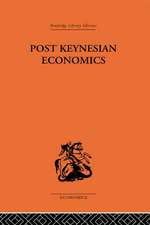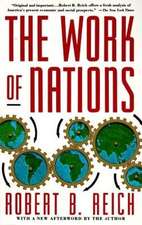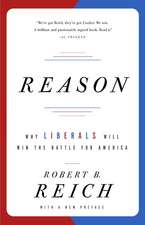The Future of Success: Working and Living in the New Economy
Autor Robert B. Reichen Limba Engleză Paperback – 31 dec 2001
With the clarity and insight that are his hallmarks, Reich delineates what success has come to mean in our time. He demonstrates that although we have more choices as consumers, and investors, the choices themselves are undermining the rest of our lives. It is getting harder for people to be confident of what they will be earning next year, or even next month. At the same time, our society is splitting into socially stratified enclaves--the wealthier walled off and gated, the poorer isolated and ignored. Although the trends he discusses are powerful, they are not irreversible, and Reich makes provocative suggestions for how we might create a more balanced society and more satisfying lives. Some of his ideas may surprise you; all should spark a healthy–and essential–national debate.
Preț: 101.99 lei
Nou
Puncte Express: 153
Preț estimativ în valută:
19.52€ • 20.43$ • 16.15£
19.52€ • 20.43$ • 16.15£
Carte disponibilă
Livrare economică 17-31 martie
Preluare comenzi: 021 569.72.76
Specificații
ISBN-13: 9780375725128
ISBN-10: 0375725121
Pagini: 304
Dimensiuni: 161 x 210 x 17 mm
Greutate: 0.24 kg
Editura: Vintage Publishing
ISBN-10: 0375725121
Pagini: 304
Dimensiuni: 161 x 210 x 17 mm
Greutate: 0.24 kg
Editura: Vintage Publishing
Notă biografică
Robert B. Reich is University Professor at Brandeis University and Maurice B. Hexter Professor of Social and Economic Policy at Brandeis's Heller Graduate School. He has served in three national administrations, most recently as Secretary of Labor under President Bill Clinton. He is cofounder and national editor of The American Prospect, and his writings have appeared in The New Yorker, The Atlantic Monthly, the New York Times, the Washington Post, and the Wall Street Journal. This is his eighth book. He lives in Cambridge, Massachusetts, with his wife, Clare Dalton. They have two sons.
Extras
Introduction
A few years ago I had a job that consumed me. I wasn't addicted to it--"addiction" suggests an irrational attachment, slightly masochistic, compulsive. My problem was that I loved my job and couldn't get enough of it. Being a member of the President's cabinet was better than any other job I'd ever had. In the morning, I couldn't wait to get to the office. At night, I left it reluctantly. Even when I was at home, part of my mind remained at work.
Not surprisingly, all other parts of my life shriveled into a dried raisin. I lost touch with my family, seeing little of my wife or my two sons. I lost contact with old friends. I even began to lose contact with myself--every aspect of myself other than what the job required. Then one evening I phoned home to tell the boys I wouldn't make it back in time to say good night. I'd already missed five bedtimes in a row. Sam, the younger of the two, said that was O.K., but asked me to wake him up whenever I got home. I explained that I'd be back so late that he would have gone to sleep long before; it was probably better if I saw him the next morning. But he insisted. I asked him why. He said he just wanted to know I was there, at home. To this day, I can't explain precisely what happened to me at that moment. Yet I suddenly knew I had to leave my job.
After I announced my resignation, I received a number of letters. Most were sympathetic, but a few of my correspondents were angry. They said my quitting sent a terrible message; it suggested that a balanced life was not compatible with a high-powered job. Many women on the fast track were already battling a culture that told them they were sacrificing too much--and here I was, they said, essentially telling people the same thing. Others complained that while it was easy for me to leave my job and find another one that paid about as well while giving me more room for the rest of my life, they didn't have that choice. They had to work long hours, or the rent wouldn't get paid and there would be no food on the table. So I was sending the wrong message to people like them, too. Still others wrote to inform me indignantly that I shouldn't think myself virtuous. Hard work was virtuous, abandoning an important job to spend more time with my family was not.
Perhaps I should have expected that my career decision would carry symbolic weight--I had, after all, been the Secretary of Labor. In fact, I'd had no intention whatsoever of sending a message about how other people should lead their lives. Certainly I didn't think there was anything virtuous about the choice I'd made. But until that time I had been making a different choice, an implicit one, without acknowledging it. That was the problem. The wake-up call my son requested was a wake-up call for me to make an explicit choice, and make it consciously.
The experience made me notice a lot of things I hadn't seen before, even though I'd spent most of my adult life examining work and the economy. It focused my attention on the struggles most of us are having over paid work and the rest of our lives--men as well as women, young people setting out on their careers, middle-aged people who in years past would have already resolved these matters--including choices that sometimes are posed starkly, but more often are subtle, and appear in various guises. And it caused me to want put together what I've observed about the large-scale changes occurring in the global economy with these small-scale personal dramas. This book is the result.
I am writing here about making a living and making a life, and why it not only seems to be but actually is getting harder to do both. Acres of paper and oceans of ink have been expended in detailing the dizzying exuberance of the emerging economy. Yet there has been almost no discussion about what it means for us as people, and about the choices that lie before us for the kinds of lives we wish to lead. The deepest anxieties of this prosperous age concern the erosion of our families, the fragmenting of our communities, and the challenge of keeping our own integrity intact. These anxieties are no less part and parcel of the emerging economy than are its enormous benefits: the wealth, the innovation, the new chances and choices.
My purpose here is to invite a debate that's larger than the admonition to "slow down and get a life." To view the struggle for a better balance between paid work and the rest of life only as a personal one, waged in private, is to ignore the larger trends that are tipping the scales. It's not just a personal choice; not simply a matter of personal balance. It's also a question of how work is--and should be--organized and rewarded. It's a question of a balanced society.
The central paradox is this: Most of us are earning more money and living better in material terms than we (or our parents) did a quarter century ago, around the time when some of the technologies on which the new economy is based--the microchip, the personal computer, the Internet--first emerged. You'd think, therefore, that it would be easier, not harder, to attend to the parts of our lives that exist outside paid work. Yet by most measures we're working longer and more frantically than before, and the time and energy left for our non-working lives are evaporating.
Why should this be? If what we do for pay is making us richer, why are our personal lives growing poorer? Why can't we dedicate more of our material gains toward making our lives outside paid work richer? The British economist John Maynard Keynes, writing in 1930, during the darkest days of the Great Depression, cheerfully predicted that in a hundred years England would be eight times better off economically, so that its people would choose to work only fifteen hours a week. Their material needs satisfied, they would see the love of money as "one of those semi-criminal, semi-pathological propensities" that affluence had cured. Keynes probably will be correct about most people being far better off materially in 2030, but incorrect about their working fewer hours, at least if Britain keeps going the way of the United States, and we keep going the way we have been.
Of course, not everyone is far better off materially than a quarter century ago. Some aren't better off at all. And many people are working harder because they have to. But here's the strange thing: The richer you are, the more likely it is that you are putting in long and harried hours at work, even obsessing about it when you're not doing it. A frenzied work life may or may not make you better off, but being better off definitely seems to carry with it more frenzy.
Consider some counterintuitive statistics: In America, college graduates earn on average 70 to 80 percent more than people with only a high-school diploma, which is twice the premium accorded to a college degree twenty-five years ago. So you might suppose that people who have graduated from college would feel they have to work somewhat less intensely than high-school grads. You'd be wrong, of course. It's the college-degree holders who are working the longer hours. And maybe you'd also think that, with the college premium having doubled, college students themselves would be somewhat less concerned about being well-off financially than they were twenty-five or thirty years ago. But you'd be wrong about that, too. Surveys show they're far more focused on financial success than ever before.1
What's happened? Have college grads become greedier, more obsessed by money? Maybe, but there's no good reason to assume so. Has our national character changed in just a few decades? It seems unlikely; the character of a people doesn't alter so quickly.
The typical American works 350 more hours a year than the typical European, more hours even than the notoriously industrious Japanese. You might then suppose that more Americans would prefer to work a bit less, sacrificing some earnings. But only 8 percent of them say they would prefer fewer hours of work for less pay, compared with 38 percent of Germans, 30 percent of Japanese, and 30 percent of Britons.
Do we have a workaholic gene that the citizens of other advanced nations lack? Or is work so much more satisfying and enjoyable here? Both seem doubtful. We didn't used to work that much harder than they did, decades ago. Why have we started to?
We hear a rising chorus of American voices resolving to slow down. Yet more of us seem to be speeding up. We say with ever more vehemence that we value family. So why are our families shrinking and family ties fraying--fewer children or no children, fewer marriages, more temporary living arrangements, more subcontracting of family functions to food preparers, therapists, counselors, and child-care givers? We talk more passionately than ever about the virtues of "community." And yet our communities are fragmenting into enclaves filled with people who earn similar incomes--the wealthier, walled off and gated; the poorer, isolated and ignored.
Are we engaged in mass hypocrisy? Mass delusion? Probably neither. Most Americans seem genuinely to be seeking more balanced lives. The problem is that balance between making a living and making a life is becoming harder to pull off because the logic of the new economy dictates that more attention be paid to work and less to personal life.
Here is my argument, in brief:
The emerging economy is offering unprecedented opportunities, an ever-expanding choice of terrific deals, fabulous products, good investments, and great jobs for people with the right talents and skills. Never before in human history have so many had access to so much so easily.
Technology is the motor. In communications, transportation, and information-processing, the new technologies that gained momentum in the 1980s and 1990s are now racing ahead at blinding speed. They are making it easier to find and get better deals from anywhere and allowing us to switch instantly to even better ones. These technologies are radically sharpening competition among sellers, which in turn is provoking a staggering wave of innovation. In order to survive, all organizations must dramatically and continuously improve--cutting costs, adding value, creating new products. The result of this tumult is higher productivity--better, faster, cheaper products and services of every description.
Economically, all of this is to our great and unequivocal benefit. But what it means for the rest of our lives--the parts that depend on firm relationships, continuity, and stability--is acutely problematic. There's no diabolical plot here, no trap cunningly devised by evil corporations and greedy capitalists. It's a matter of straightforward logic.
The easier it is for us as buyers to switch to something better, the harder we as sellers have to scramble in order to keep every customer, hold every client, seize every opportunity, get every contract. As a result, our lives are more and more frenzied.
The faster the economy changes--with new innovations and opportunities engendering faster switches by customers and investors in response--the harder it is for people to be confident of what any of us will earn next year or even next month, what they will be doing, where they will be doing it. As a result, our lives are less predictable.
The more intense the competition to offer better products and services, the greater the demand for people with insights and ideas about how to do so. And because the demand for such people is growing faster than the supply, their earnings are pushed upward. Yet the same competition is pushing downward the pay of people doing routine work that can be done faster and cheaper by hardware and software, or by workers elsewhere around the world. As a result, disparities in earnings are growing steadily larger.
Finally, the wider the choices and easier the switches, the less difficult it is for people to link up with others who are just as well educated, wealthy, and healthy as they are--within residential communities, businesses, schools, universities, and insurance groups. And the easier it is for them to exclude the slower, less educated, poorer, sicker, or otherwise more disadvantaged, all of whom have greater needs. As a result, our society is becoming more fragmented.
In short, rewards of the new economy are coming at the price of lives that are more frenzied, less secure, more economically divergent, more socially stratified. As buyers switch more easily to better deals, all of us have little choice but to work harder to satisfy buyers. As our earnings become less predictable, we leap at every chance to make hay while the sun shines. As the stakes rise--toward greater wealth or relative poverty, highly desirable communities or patently undesirable ones--we'll do whatever we can to be in the winner's circle and to get our children safely there as well.
For all these reasons, most of us are working harder and more frantically than we did decades ago when these trends were just beginning, and than do citizens of other modern nations where these trends are not as far along.
The price may be worth it. The terrific deals are benefiting all of us in myriad ways. But even if the price is acceptable today, will it still be worth it in the future as the stakes continue to rise?
There is, undeniably, much to celebrate about the new economy. American capitalism is triumphant all over the world, and with good reason. Neo-Luddites who claim that advancing technologies will eliminate jobs and relegate most of us to poverty are wrong, even silly. Isolationists and xenophobes who want to put up the gates and reduce trade and immigration are misguided, often dangerously so. Paranoid populists who say global corporations and international capitalists are conspiring against us are deluded, possibly hallucinating. We--you and I and most Americans--are benefiting mightily from the new economy. We are reaping the gains of its new inventions, its lower prices, its fierce competition. We are profiting from the terrific deals it's offering us as consumers, and to a large and growing portion of us as investors. We are driving the new economy forward.
And yet . . . As wondrous as the new economy is, we are also losing parts of our lives to it--aspects of our family lives, our friendships, our communities, ourselves. These losses closely parallel the benefits we're gaining. In an important sense, they are two sides of the same coin. And as the new economy accelerates, both the gains and the losses are likely to increase. Working ever harder in order to compete within a system where competition is growing fiercer; selling ourselves with increasing determination within a system that's turning almost everyone into a self-promoter; sorting by wealth, education, and health in a system that's making it ever easier to sort--these phenomena are self-propelling. The more people join in, the more imbalanced the situation becomes, and the harder it becomes for any individual to choose a different path.
In the pages ahead, I explore these trends and their implications in detail. Part One of the book is about the new work. In it, I explain how new technologies are changing the way work is organized and rewarded. Part Two is about the new life. There, I explore the consequences of the new work for ourselves, our families, and our communities. Part Three is about the personal and social choices all of this implies.
The trends I discuss are powerful indeed--but they are not irreversible, or at least not unalterable. We can, if we wish, reassess our standard measure of success. We can affirm that our life's worth isn't synonymous with our net worth; that the quality of our society is different from our gross national product. We can, if we want, choose fuller and more balanced lives, and we can create a more balanced society. The question is: Do we really want to?
From the Hardcover edition.
A few years ago I had a job that consumed me. I wasn't addicted to it--"addiction" suggests an irrational attachment, slightly masochistic, compulsive. My problem was that I loved my job and couldn't get enough of it. Being a member of the President's cabinet was better than any other job I'd ever had. In the morning, I couldn't wait to get to the office. At night, I left it reluctantly. Even when I was at home, part of my mind remained at work.
Not surprisingly, all other parts of my life shriveled into a dried raisin. I lost touch with my family, seeing little of my wife or my two sons. I lost contact with old friends. I even began to lose contact with myself--every aspect of myself other than what the job required. Then one evening I phoned home to tell the boys I wouldn't make it back in time to say good night. I'd already missed five bedtimes in a row. Sam, the younger of the two, said that was O.K., but asked me to wake him up whenever I got home. I explained that I'd be back so late that he would have gone to sleep long before; it was probably better if I saw him the next morning. But he insisted. I asked him why. He said he just wanted to know I was there, at home. To this day, I can't explain precisely what happened to me at that moment. Yet I suddenly knew I had to leave my job.
After I announced my resignation, I received a number of letters. Most were sympathetic, but a few of my correspondents were angry. They said my quitting sent a terrible message; it suggested that a balanced life was not compatible with a high-powered job. Many women on the fast track were already battling a culture that told them they were sacrificing too much--and here I was, they said, essentially telling people the same thing. Others complained that while it was easy for me to leave my job and find another one that paid about as well while giving me more room for the rest of my life, they didn't have that choice. They had to work long hours, or the rent wouldn't get paid and there would be no food on the table. So I was sending the wrong message to people like them, too. Still others wrote to inform me indignantly that I shouldn't think myself virtuous. Hard work was virtuous, abandoning an important job to spend more time with my family was not.
Perhaps I should have expected that my career decision would carry symbolic weight--I had, after all, been the Secretary of Labor. In fact, I'd had no intention whatsoever of sending a message about how other people should lead their lives. Certainly I didn't think there was anything virtuous about the choice I'd made. But until that time I had been making a different choice, an implicit one, without acknowledging it. That was the problem. The wake-up call my son requested was a wake-up call for me to make an explicit choice, and make it consciously.
The experience made me notice a lot of things I hadn't seen before, even though I'd spent most of my adult life examining work and the economy. It focused my attention on the struggles most of us are having over paid work and the rest of our lives--men as well as women, young people setting out on their careers, middle-aged people who in years past would have already resolved these matters--including choices that sometimes are posed starkly, but more often are subtle, and appear in various guises. And it caused me to want put together what I've observed about the large-scale changes occurring in the global economy with these small-scale personal dramas. This book is the result.
I am writing here about making a living and making a life, and why it not only seems to be but actually is getting harder to do both. Acres of paper and oceans of ink have been expended in detailing the dizzying exuberance of the emerging economy. Yet there has been almost no discussion about what it means for us as people, and about the choices that lie before us for the kinds of lives we wish to lead. The deepest anxieties of this prosperous age concern the erosion of our families, the fragmenting of our communities, and the challenge of keeping our own integrity intact. These anxieties are no less part and parcel of the emerging economy than are its enormous benefits: the wealth, the innovation, the new chances and choices.
My purpose here is to invite a debate that's larger than the admonition to "slow down and get a life." To view the struggle for a better balance between paid work and the rest of life only as a personal one, waged in private, is to ignore the larger trends that are tipping the scales. It's not just a personal choice; not simply a matter of personal balance. It's also a question of how work is--and should be--organized and rewarded. It's a question of a balanced society.
The central paradox is this: Most of us are earning more money and living better in material terms than we (or our parents) did a quarter century ago, around the time when some of the technologies on which the new economy is based--the microchip, the personal computer, the Internet--first emerged. You'd think, therefore, that it would be easier, not harder, to attend to the parts of our lives that exist outside paid work. Yet by most measures we're working longer and more frantically than before, and the time and energy left for our non-working lives are evaporating.
Why should this be? If what we do for pay is making us richer, why are our personal lives growing poorer? Why can't we dedicate more of our material gains toward making our lives outside paid work richer? The British economist John Maynard Keynes, writing in 1930, during the darkest days of the Great Depression, cheerfully predicted that in a hundred years England would be eight times better off economically, so that its people would choose to work only fifteen hours a week. Their material needs satisfied, they would see the love of money as "one of those semi-criminal, semi-pathological propensities" that affluence had cured. Keynes probably will be correct about most people being far better off materially in 2030, but incorrect about their working fewer hours, at least if Britain keeps going the way of the United States, and we keep going the way we have been.
Of course, not everyone is far better off materially than a quarter century ago. Some aren't better off at all. And many people are working harder because they have to. But here's the strange thing: The richer you are, the more likely it is that you are putting in long and harried hours at work, even obsessing about it when you're not doing it. A frenzied work life may or may not make you better off, but being better off definitely seems to carry with it more frenzy.
Consider some counterintuitive statistics: In America, college graduates earn on average 70 to 80 percent more than people with only a high-school diploma, which is twice the premium accorded to a college degree twenty-five years ago. So you might suppose that people who have graduated from college would feel they have to work somewhat less intensely than high-school grads. You'd be wrong, of course. It's the college-degree holders who are working the longer hours. And maybe you'd also think that, with the college premium having doubled, college students themselves would be somewhat less concerned about being well-off financially than they were twenty-five or thirty years ago. But you'd be wrong about that, too. Surveys show they're far more focused on financial success than ever before.1
What's happened? Have college grads become greedier, more obsessed by money? Maybe, but there's no good reason to assume so. Has our national character changed in just a few decades? It seems unlikely; the character of a people doesn't alter so quickly.
The typical American works 350 more hours a year than the typical European, more hours even than the notoriously industrious Japanese. You might then suppose that more Americans would prefer to work a bit less, sacrificing some earnings. But only 8 percent of them say they would prefer fewer hours of work for less pay, compared with 38 percent of Germans, 30 percent of Japanese, and 30 percent of Britons.
Do we have a workaholic gene that the citizens of other advanced nations lack? Or is work so much more satisfying and enjoyable here? Both seem doubtful. We didn't used to work that much harder than they did, decades ago. Why have we started to?
We hear a rising chorus of American voices resolving to slow down. Yet more of us seem to be speeding up. We say with ever more vehemence that we value family. So why are our families shrinking and family ties fraying--fewer children or no children, fewer marriages, more temporary living arrangements, more subcontracting of family functions to food preparers, therapists, counselors, and child-care givers? We talk more passionately than ever about the virtues of "community." And yet our communities are fragmenting into enclaves filled with people who earn similar incomes--the wealthier, walled off and gated; the poorer, isolated and ignored.
Are we engaged in mass hypocrisy? Mass delusion? Probably neither. Most Americans seem genuinely to be seeking more balanced lives. The problem is that balance between making a living and making a life is becoming harder to pull off because the logic of the new economy dictates that more attention be paid to work and less to personal life.
Here is my argument, in brief:
The emerging economy is offering unprecedented opportunities, an ever-expanding choice of terrific deals, fabulous products, good investments, and great jobs for people with the right talents and skills. Never before in human history have so many had access to so much so easily.
Technology is the motor. In communications, transportation, and information-processing, the new technologies that gained momentum in the 1980s and 1990s are now racing ahead at blinding speed. They are making it easier to find and get better deals from anywhere and allowing us to switch instantly to even better ones. These technologies are radically sharpening competition among sellers, which in turn is provoking a staggering wave of innovation. In order to survive, all organizations must dramatically and continuously improve--cutting costs, adding value, creating new products. The result of this tumult is higher productivity--better, faster, cheaper products and services of every description.
Economically, all of this is to our great and unequivocal benefit. But what it means for the rest of our lives--the parts that depend on firm relationships, continuity, and stability--is acutely problematic. There's no diabolical plot here, no trap cunningly devised by evil corporations and greedy capitalists. It's a matter of straightforward logic.
The easier it is for us as buyers to switch to something better, the harder we as sellers have to scramble in order to keep every customer, hold every client, seize every opportunity, get every contract. As a result, our lives are more and more frenzied.
The faster the economy changes--with new innovations and opportunities engendering faster switches by customers and investors in response--the harder it is for people to be confident of what any of us will earn next year or even next month, what they will be doing, where they will be doing it. As a result, our lives are less predictable.
The more intense the competition to offer better products and services, the greater the demand for people with insights and ideas about how to do so. And because the demand for such people is growing faster than the supply, their earnings are pushed upward. Yet the same competition is pushing downward the pay of people doing routine work that can be done faster and cheaper by hardware and software, or by workers elsewhere around the world. As a result, disparities in earnings are growing steadily larger.
Finally, the wider the choices and easier the switches, the less difficult it is for people to link up with others who are just as well educated, wealthy, and healthy as they are--within residential communities, businesses, schools, universities, and insurance groups. And the easier it is for them to exclude the slower, less educated, poorer, sicker, or otherwise more disadvantaged, all of whom have greater needs. As a result, our society is becoming more fragmented.
In short, rewards of the new economy are coming at the price of lives that are more frenzied, less secure, more economically divergent, more socially stratified. As buyers switch more easily to better deals, all of us have little choice but to work harder to satisfy buyers. As our earnings become less predictable, we leap at every chance to make hay while the sun shines. As the stakes rise--toward greater wealth or relative poverty, highly desirable communities or patently undesirable ones--we'll do whatever we can to be in the winner's circle and to get our children safely there as well.
For all these reasons, most of us are working harder and more frantically than we did decades ago when these trends were just beginning, and than do citizens of other modern nations where these trends are not as far along.
The price may be worth it. The terrific deals are benefiting all of us in myriad ways. But even if the price is acceptable today, will it still be worth it in the future as the stakes continue to rise?
There is, undeniably, much to celebrate about the new economy. American capitalism is triumphant all over the world, and with good reason. Neo-Luddites who claim that advancing technologies will eliminate jobs and relegate most of us to poverty are wrong, even silly. Isolationists and xenophobes who want to put up the gates and reduce trade and immigration are misguided, often dangerously so. Paranoid populists who say global corporations and international capitalists are conspiring against us are deluded, possibly hallucinating. We--you and I and most Americans--are benefiting mightily from the new economy. We are reaping the gains of its new inventions, its lower prices, its fierce competition. We are profiting from the terrific deals it's offering us as consumers, and to a large and growing portion of us as investors. We are driving the new economy forward.
And yet . . . As wondrous as the new economy is, we are also losing parts of our lives to it--aspects of our family lives, our friendships, our communities, ourselves. These losses closely parallel the benefits we're gaining. In an important sense, they are two sides of the same coin. And as the new economy accelerates, both the gains and the losses are likely to increase. Working ever harder in order to compete within a system where competition is growing fiercer; selling ourselves with increasing determination within a system that's turning almost everyone into a self-promoter; sorting by wealth, education, and health in a system that's making it ever easier to sort--these phenomena are self-propelling. The more people join in, the more imbalanced the situation becomes, and the harder it becomes for any individual to choose a different path.
In the pages ahead, I explore these trends and their implications in detail. Part One of the book is about the new work. In it, I explain how new technologies are changing the way work is organized and rewarded. Part Two is about the new life. There, I explore the consequences of the new work for ourselves, our families, and our communities. Part Three is about the personal and social choices all of this implies.
The trends I discuss are powerful indeed--but they are not irreversible, or at least not unalterable. We can, if we wish, reassess our standard measure of success. We can affirm that our life's worth isn't synonymous with our net worth; that the quality of our society is different from our gross national product. We can, if we want, choose fuller and more balanced lives, and we can create a more balanced society. The question is: Do we really want to?
From the Hardcover edition.
Recenzii
"Reich is a big thinker and a great writer." –The Washington Post
“A valuable work. . . . Reich has a talent for mastering economic and social complexities and making them easy for the layperson to grasp.” –The Wall Street Journal
"A well-researched and documented analysis of the present state of working life in America." –The Plain Dealer
“Reich writes in ways unusual for an economist; he is self-effacing, witty and more interested in exploring the world’s complexities than in uncovering unvarying laws.” – The New York Times Book Review
“A valuable work. . . . Reich has a talent for mastering economic and social complexities and making them easy for the layperson to grasp.” –The Wall Street Journal
"A well-researched and documented analysis of the present state of working life in America." –The Plain Dealer
“Reich writes in ways unusual for an economist; he is self-effacing, witty and more interested in exploring the world’s complexities than in uncovering unvarying laws.” – The New York Times Book Review
Descriere
If you think it's getting harder to both make a living and make a life, economist, former Secretary of Labor and bestselling author of "Work of Nations" Robert Reich agrees. In this updated book with a new Introduction, he shows that the terrific deals of the new economy carry a steep price.
